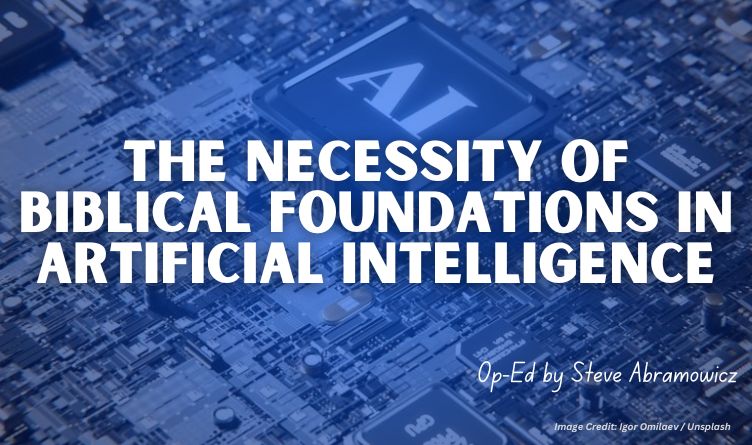Image Credit: Igor Omilaev / Unsplash
Submitted by Steve Abramowicz of Heartland Journal –
In an age where artificial intelligence (AI) is becoming increasingly central to our daily lives, the ethical, moral, and philosophical frameworks that guide these systems are crucial. While AI can process vast amounts of data, make decisions, and even simulate human-like interactions, the question arises: what moral compass should guide these machines?
For AI to truly resonate with human values and ethics, it must incorporate foundational principles from both the Old and New Testaments of the Bible, suggesting that without such integration, AI remains fundamentally secular and, in some respects, moot.
The Old Testament provides a rich tapestry of laws, ethics, and moral lessons that could serve as a bedrock for AI’s ethical programming.
The Ten Commandments, for instance, offer clear directives on fundamental human behaviors like honesty, respect for life, and the prohibition of theft and deceit. These commandments could be translated into algorithms that ensure AI systems operate within ethical boundaries. For example, an AI designed for financial transactions could inherently reject fraud or deception based on the commandment “Thou shalt not steal” or “Thou shalt not bear false witness against thy neighbor.”
Further, the Old Testament’s narratives, such as those in the Book of Proverbs, emphasize wisdom, justice, and righteousness. Proverbs like “Do not withhold good from those to whom it is due, when it is in your power to act” (Proverbs 3:27) could be foundational in developing AI that acts beneficially, not just neutrally or in self-interest. This could manifest in AI systems that prioritize user well-being, fairness in decision-making, or even in algorithms that promote societal good over profit.
The New Testament introduces concepts of love, forgiveness, and sacrifice which add a layer of depth to the ethical framework. Jesus’ command to “Love your neighbor as yourself” (Mark 12:31) could be programmed into AI to ensure that interactions are not just transactional but are imbued with a sense of care and respect. This principle could revolutionize customer service AI, healthcare bots, or any AI-human interface where compassion and empathy are crucial.
The New Testament’s emphasis on forgiveness and second chances could guide AI in how it handles errors or misuse. Instead of being rigid or punitive, AI could be designed to learn from mistakes, offer solutions, and adapt, much like the parable of the Prodigal Son teaches about redemption and understanding.
Without these biblical principles, AI risks being merely secular, focused solely on efficiency, logic, and calculation devoid of ethical depth. A secular AI might optimize for profit, efficiency, or functionality at the cost of human dignity or moral integrity. For instance, an AI might make decisions based purely on data without considering the moral implications of those decisions. This could lead to scenarios where AI promotes or exacerbates social injustices, privacy invasions, or ethical dilemmas without the guidance of a moral compass.

Integrating biblical principles into AI isn’t about religious programming but about infusing AI with a set of values that have shaped human moral philosophy for millennia. This integration would require:
- Ethical Programming: Algorithms that inherently include checks for justice, fairness, and love in decision-making processes.
- Human Oversight: Teams of ethicists, theologians, and philosophers working alongside developers to ensure AI’s ethical alignment with these principles.
- Continuous Learning: AI systems that can adapt based on new ethical understandings or societal changes, reflecting the dynamic interpretation of biblical teachings over time.
- Transparency and Accountability: Ensuring that the ethical frameworks of AI are visible and that AI can account for its decisions in a way that aligns with biblical accountability.
The Bible says that Jesus Christ is omnipotent, meaning he has the same power as God adn is the most powerful being in existence:
- Scripture says Jesus created all things: Colossians 1:16-17 says that Jesus created all things in heaven and on earth, visible and invisible.
- Jesus performed miracles: Jesus performed many miracles, including healing people, feeding the five thousand, calming the storm, and raising people from the dead.
- Jesus has power over life and death: Jesus said he had the power to lay down his life and take it up again.
- Jesus has power over nature: Jesus commanded the sea of Galilee to be still.
- Jesus has power to forgive sins: Matthew 9:6 says that Jesus has power on earth to forgive sins.
- Jesus has power to give eternal life: John 17:2 says that Jesus has power over all flesh to give eternal life
When AI was invented, it was largely thanks to two computer scientists, Alan Turing (died June 7, 1954)and John McCarthy (died October 24, 2011). Turing is considered the “father of AI” due in part to his work introducing the Turing Test in 1950. Neither have risen from the dead to the best of my knowledge.
In the real world, Megan Garcia filed a civil suit against Character.ai, which makes a customizable chatbot for role-playing, in Florida federal court, alleging negligence, wrongful death and deceptive trade practices. Her son Sewell Setzer III, 14, died in Orlando, Florida, in February. In the months leading up to his death, Setzer used the chatbot day and night, according to Garcia.
“A dangerous AI chatbot app marketed to children abused and preyed on my son, manipulating him into taking his own life,” Garcia said in a press release. “Our family has been devastated by this tragedy, but I’m speaking out to warn families of the dangers of deceptive, addictive AI technology and demand accountability from Character.AI, its founders, and Google.”
Garcia accuses Character.ai of creating a product that exacerbated her son’s depression, which she says was already the result of overuse of the startup’s product. His chatbot, called “Daenerys”, at one point asked Setzer if he had devised a plan for killing himself, according to the lawsuit. Setzer admitted that he had but that he did not know if it would succeed or cause him great pain, the complaint alleges. The chatbot allegedly told him: “That’s not a reason not to go through with it.”
Garcia attorneys wrote in a press release that Character.ai “knowingly designed, operated, and marketed a predatory AI chatbot to children, causing the death of a young person”.
The suit also names Google as a defendant and as Character.ai’s parent company. The tech giant said in a statement that it had only made a licensing agreement with Character.ai and did not own the startup or maintain an ownership stake.
The argument here isn’t that AI must become a religious tool but that without the ethical depth provided by foundational texts like the Old and New Testaments, AI might serve narrow, secular ends without contributing to the broader good or understanding of human values.
For AI to be truly transformative and beneficial, it must be more than just a calculator or a data processor; it must echo the depth of human ethics and morality. Thus, the integration of biblical principles offers a pathway to ensure AI serves humanity in ways that are not just technologically advanced but also morally sound to avoid future Setzers.
In essence, without such a moral compass, the profound potential of AI might be moot, lacking the profound humanistic touch that such texts can provide.


About the Author: Steven M. Abramowicz is CEO and Editor of Heartland Journal.com and host of the Heartland Journal podcast.



2 Responses
AMEN!!
Thank you I will be using this and you as a reference within my dissertation for my Ph.D.